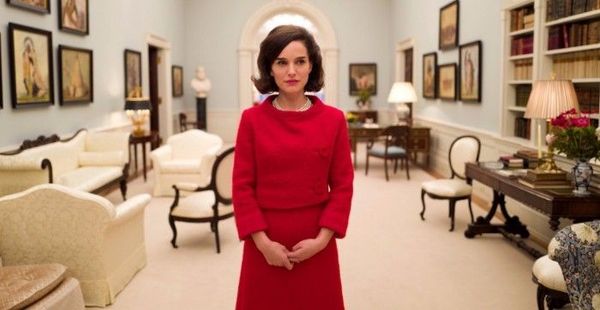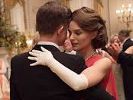Eye For Film >> Movies >> Jackie (2016) Film Review
Jackie
Reviewed by: Jennie Kermode

After Steve McQueen with 12 Years A Slave and Alejandro González Iñárritu with The Revenant], Pablo Larraín becomes the latest director to bring an outsider's perspective to American history. Shunning the usual conspiracy theories and political melodrama associated with the death of John F Kennedy, he focuses on what is arguably the most interesting part of the story: the personal impact of this political crime on the woman at the heart of it all, and the clash between the symbolic and the human that forced Jackie to perform as she never had before.
Larraín's treatment of the subject is very much a study of performance, and it's fitting that he has as his star Natalie Portman, an actress whose mannered style is, depending on one's perspective, as endearing or as irritating as Jackie's own. Portman lends that sugar-sweet, unnatural voice a brittle edge. This is a woman performing the role of First Lady, the role of the perfect wife and mother (in the face of quite a bit of provocation), then that of widow. She is performing femininity under the full glare of a nation, and it's a role so riddled with contradictions that there's no way she can keep everybody happy. There is, however, a clear list of characteristics she cannot show; she must keep her intelligence and her own political opinions carefully hidden, though like many politicians' partners, she's an instinctive and capable strategist. She must also hide her anger at a time when she has ample reason for it. Ultimately, it is through what the world perceives as grace that she exhibits her strength.

This is a film full of little glances, sharp switches between private moments and potentially public ones. Portman is in close-up for a considerable proportion of the running time, a choice which, in itself, serves to illustrate what it must feel like to be under such scrutiny in life. She doesn't really have the charisma to sustain this for an hour and 39 minutes, but when the idea runs thin, there is plenty to distract oneself with in the admirable precision of Larraín's framing and the elegant symmetry of his sets, both of which contribute to the theme of artificiality. His painstakingly recreated White House is Jackie's home and the only retreat she has, but it's one she must leave peremptorily on account of no longer being married to a president, something which adds to the horror in an early scene when she walks into the bedroom where, on one of the most painful occasions of her life, she must spend the night alone. This building into which she has poured all her effort for two years will soon be reinvented by somebody else, making it even harder for her to envisage her future. Everything resides in the now.
Jackie's children are almost absent from the film, cared for by staff who will just as summarily be ripped away from them. We see JFK's death in close-up, from different angles at different times, speaking to the difference between true memory and the memory of a memory, but always from inside the car. Despite being the cause of all this calamity it comes to seem almost incidental. There are flashbacks; notably, most are of public moments, of dancing together, of talking in front of people. Where is Jackie's husband? Where has he been for all these years?
In sum, this is a film full of cultivated emptiness, often more gloss than substance, but this may be entirely deliberate. It invites viewers to recognise themselves as voyeurs. All those beautiful artificial vistas remind us that we are strangers here, that all we can do is watch; that the real Jackie, and her celebrated pain, are unknowable.
Reviewed on: 26 Nov 2016
















